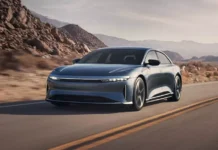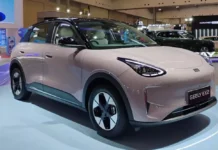According to The Driven, the government of New South Wales, the most populous state in Australia with the bustling city of Sydney as its capital, has announced that it will invest $10 million to install additional electric vehicle charging stations in 100 apartment buildings across the state. This initiative applies to buildings with 10 or more units and will provide a subsidy of up to 80% or a maximum of $80,000 for necessary upgrades and the purchase and installation of charging equipment.
“New South Wales becomes the first state in the country to support the upgrading of electric vehicle infrastructure in apartment buildings, making electric vehicle ownership more appealing to many. Over 90% of electric vehicle owners charge at home, and we want apartment dwellers to have the same opportunity,” said Penny Sharpe, head of the state’s energy management agency.
An underground electric vehicle charging point at an apartment building in Sydney, Australia
In Australia, access to charging infrastructure is a challenge for many apartment buildings, as some residents are hesitant to install charging stations. Some electric vehicle owners have raised concerns about being unfairly denied access to electricity for charging.
In response to this issue, the government of New South Wales is providing funding to address the increasing demand for fair “charging rights” for apartment dwellers, as electric vehicles become more popular in the country.
In 2021, New South Wales amended its laws to allow apartment buildings to install charging or solar energy systems on rooftops with the agreement of at least half of the owners.
In addition to policy changes, New South Wales has previously funded a pilot project to upgrade the electrical system and provide charging equipment for all 104 parking spaces in the Richmont building located in the Sydney suburb of Pyrmont. The state has also sponsored 15 feasibility studies to explore the addition of charging equipment for apartment buildings and shopping centers in the Sydney metropolitan area.
Effective from October 2023, the Australian National Construction Law mandates the installation of electric vehicle charging systems in parking areas for all new residential projects
By May 2022, New South Wales’ energy management agency issued guidelines for the deployment of electric vehicle charging infrastructure in apartment and commercial buildings. According to the agency, in addition to ensuring “charging rights” for vehicle owners, the availability of charging infrastructure will increase the value of real estate and attract tenants, considering the growing popularity of electric vehicles.
“With the global shift towards electric vehicles, it’s not a matter of if, but when buildings will need to provide charging infrastructure,” said Matt Kean, head of New South Wales’ energy management agency, at the time.
Australia is one of the most promising markets for electric vehicles, with 48% of surveyed individuals expressing their preference for electric vehicles as their next car. However, the lack of charging stations hinders the widespread adoption of clean energy vehicles in the country. In 2022, only 3.8% of vehicles sold in Australia were electric, significantly lower than the rates of 15% in the UK and 17% in Europe.
Acknowledging this obstacle, Australia unveiled its first national electric vehicle strategy in April of this year. According to Australia’s Minister of Energy, Chris Bowen, the strategy aims to reduce at least 3 million tons of carbon emissions by 2030 and over 10 million tons by 2035. He believes that transitioning to electric vehicles is not only environmentally friendly but also cost-effective, offering benefits to both the country and consumers.
The Electric Vehicle Council (EVC) welcomes this initiative but urges Australia to establish stronger standards; otherwise, the country “will remain a global landfill for old vehicles with high emissions.”
Trang Nguyen (Forum.autodaily.vn)
Source: The Driven, Reuters, Carscoops














































